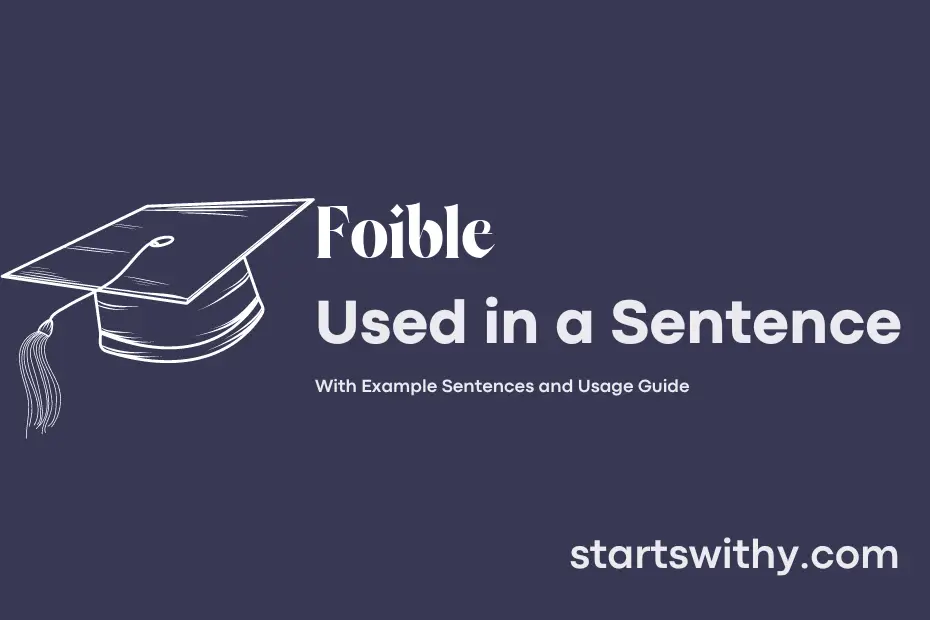Have you ever heard of the term “foible” before? A foible refers to a minor flaw or weakness in someone’s character or behavior.
Often seen as harmless quirks, foibles can provide insight into an individual’s unique personality traits. Despite being considered shortcomings, these idiosyncrasies can add depth and charm to a person’s character. Let’s explore how this term is used in everyday conversation and writing.
7 Examples Of Foible Used In a Sentence For Kids
- My sister’s foible is that she always forgets where she puts her toys.
- Tommy’s foible is that he sometimes talks too loudly during class.
- Lily’s foible is that she often mixes up her left and right shoes.
- One of Bobby’s foibles is that he likes to wear mismatched socks.
- Sarah’s foible is that she is afraid of the dark.
- Johnny’s foible is that he is always late to school in the morning.
- Amy’s foible is that she likes to eat dessert before her meal.
14 Sentences with Foible Examples
- Foible can potentially affect how others perceive you in a professional setting.
- It’s important to recognize and address your own foibles in order to grow and improve as a student.
- Overcoming personal foibles can lead to increased self-confidence and success in academic pursuits.
- Understanding your study foibles can help you develop better study habits.
- Don’t let your foibles hold you back from participating in class discussions and activities.
- Seeking feedback from professors can help you identify and work on your foibles.
- Joining study groups can provide opportunities for identifying and addressing foibles.
- Procrastination is a common foible among college students that can impact academic performance.
- Developing time management skills can help mitigate the effects of various foibles.
- Embracing your foibles as areas for potential growth can lead to personal development.
- Peer support can be beneficial in addressing and overcoming personal foibles.
- Recognizing and accepting your foibles is the first step towards personal growth.
- Reflecting on your actions and behaviors can help you identify potential foibles.
- Taking steps to address your foibles can lead to a more fulfilling college experience.
How To Use Foible in Sentences?
Foible is a noun used to describe a minor weakness or flaw in someone’s character or behavior. To use foible in a sentence, start by identifying the particular weakness or flaw you want to highlight. For example, “Despite his many talents, John’s foible was his tendency to procrastinate on important tasks.”
Next, place foible in your sentence in a way that accurately reflects the minor flaw or weakness you are referring to. Remember to ensure that the sentence makes sense contextually and grammatically.
When using foible, it’s essential to provide enough context so that the reader understands the specific aspect of the person’s character or behavior that you are highlighting. This will help to convey your message clearly and effectively.
Additionally, consider using descriptive language to paint a vivid picture of the foible you are describing. This can help create a more engaging and memorable sentence.
In summary, to use foible effectively in a sentence for beginners, identify the weakness or flaw you want to highlight, incorporate foible into your sentence with proper context, and use descriptive language to enhance your message.
Conclusion
In summary, the examples of sentences with “foible” demonstrate how this word is used to describe minor weaknesses or flaws in someone’s character or behavior. These examples illustrate how “foible” is often utilized to point out harmless or endearing quirks rather than serious faults. Whether referring to a friend’s tendency to be a bit forgetful or a colleague’s habit of always running late, “foible” denotes imperfections that are generally accepted and not cause for serious concern.
Overall, the sentences with “foible” highlight the word’s positive connotation, emphasizing the lighthearted and relatable nature of the shortcomings it describes. By using “foible,” individuals can acknowledge and even appreciate the unique traits that make people human, adding depth and personality to their character without passing judgment on their shortcomings.



